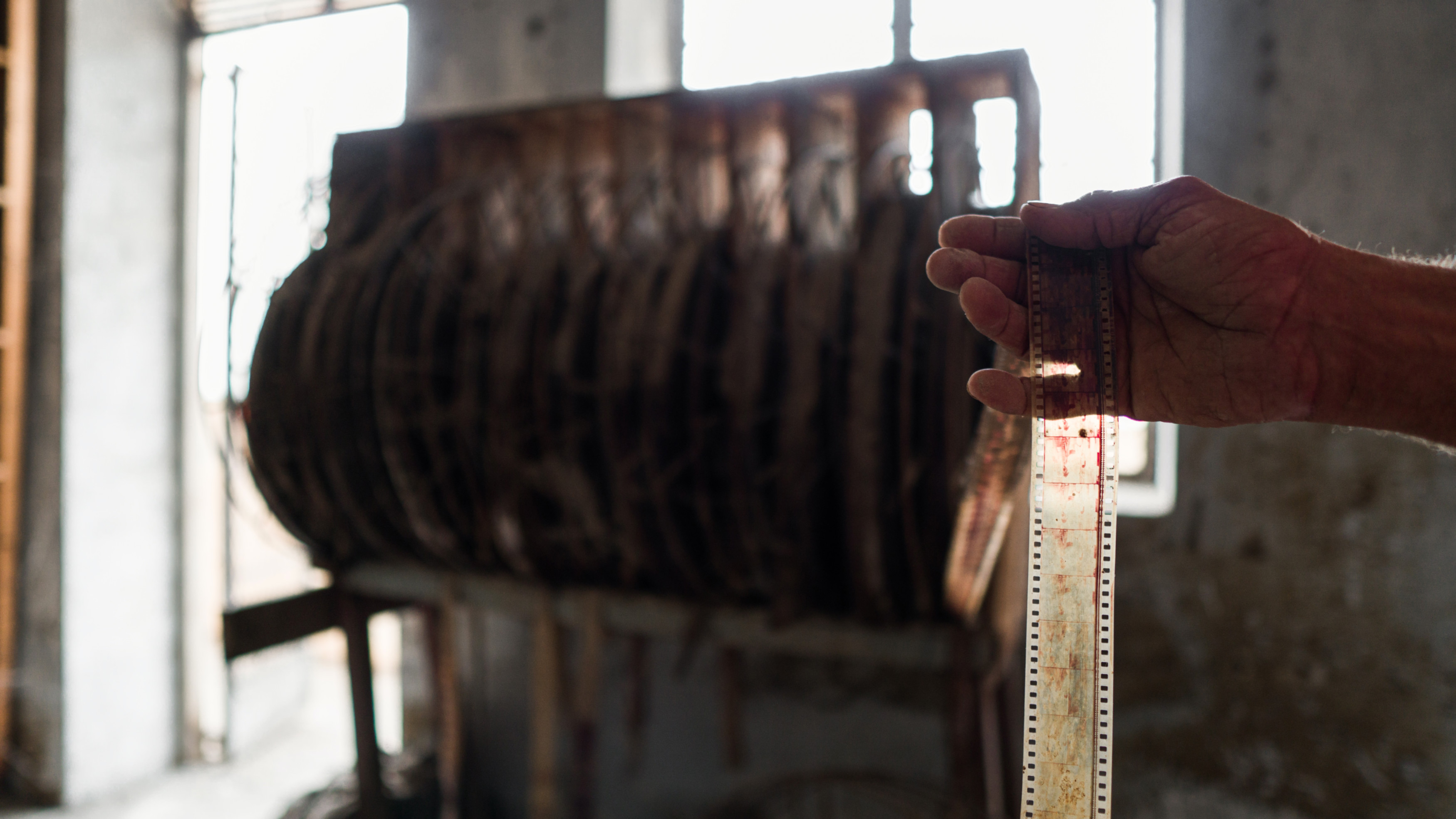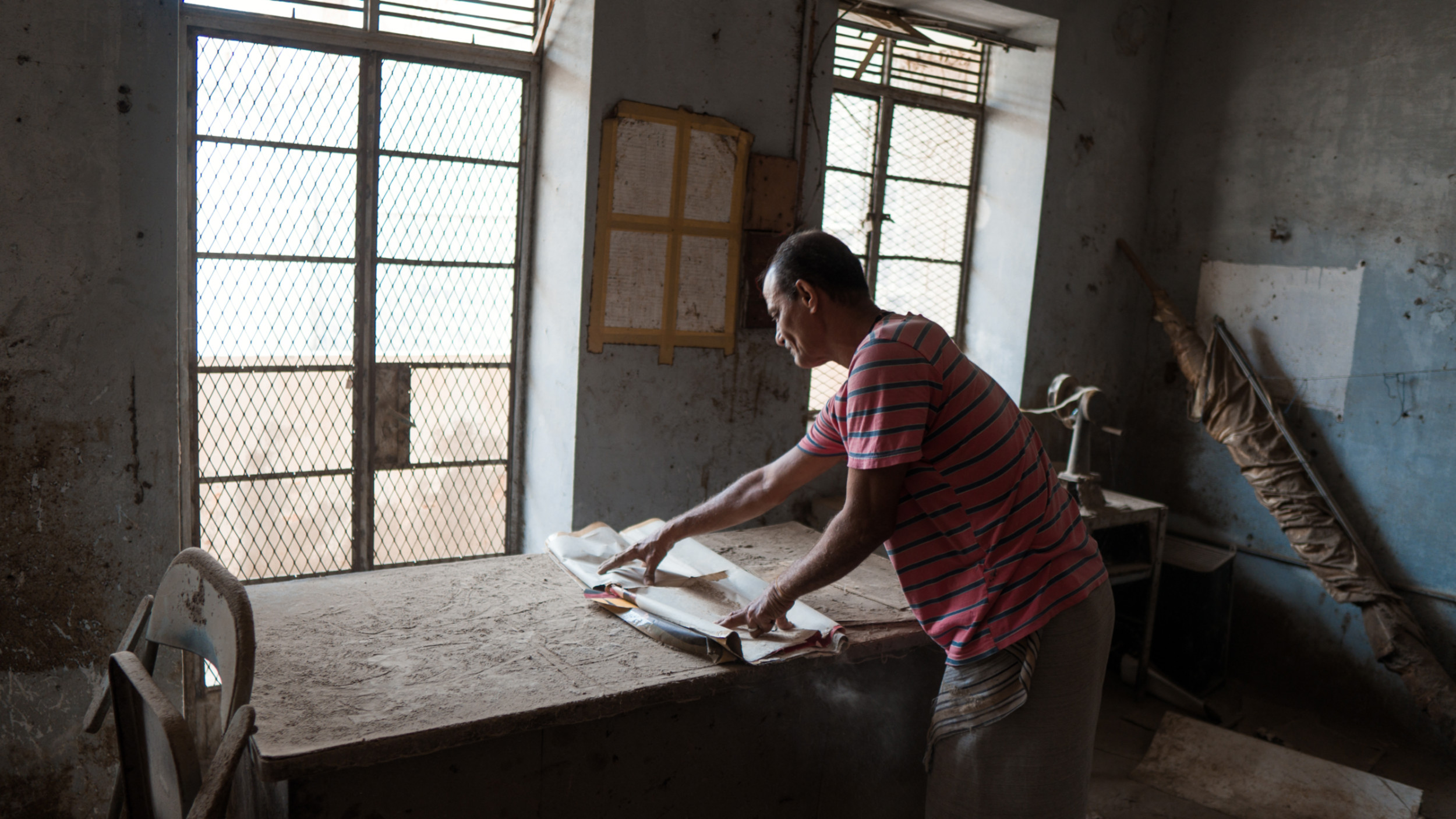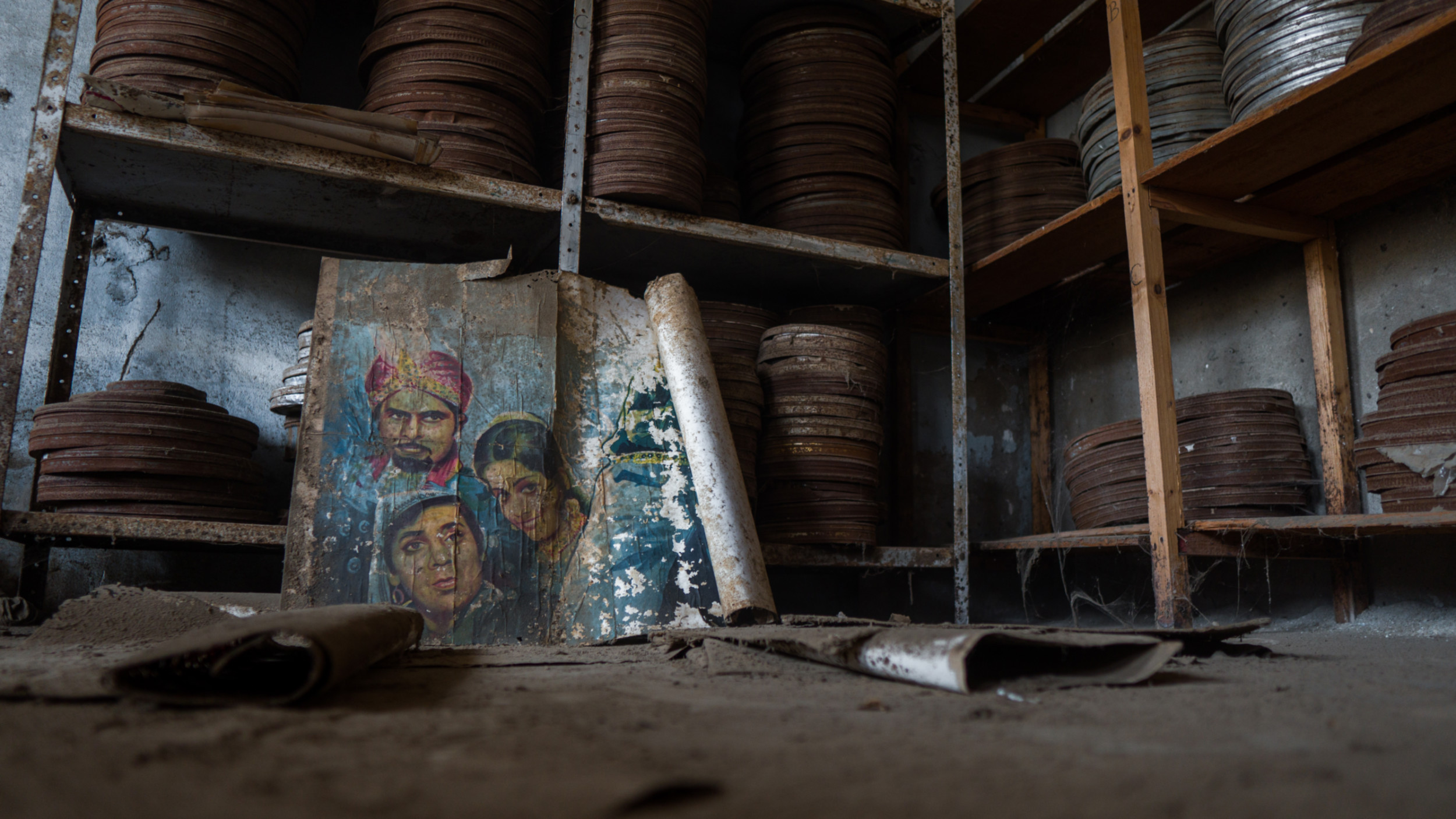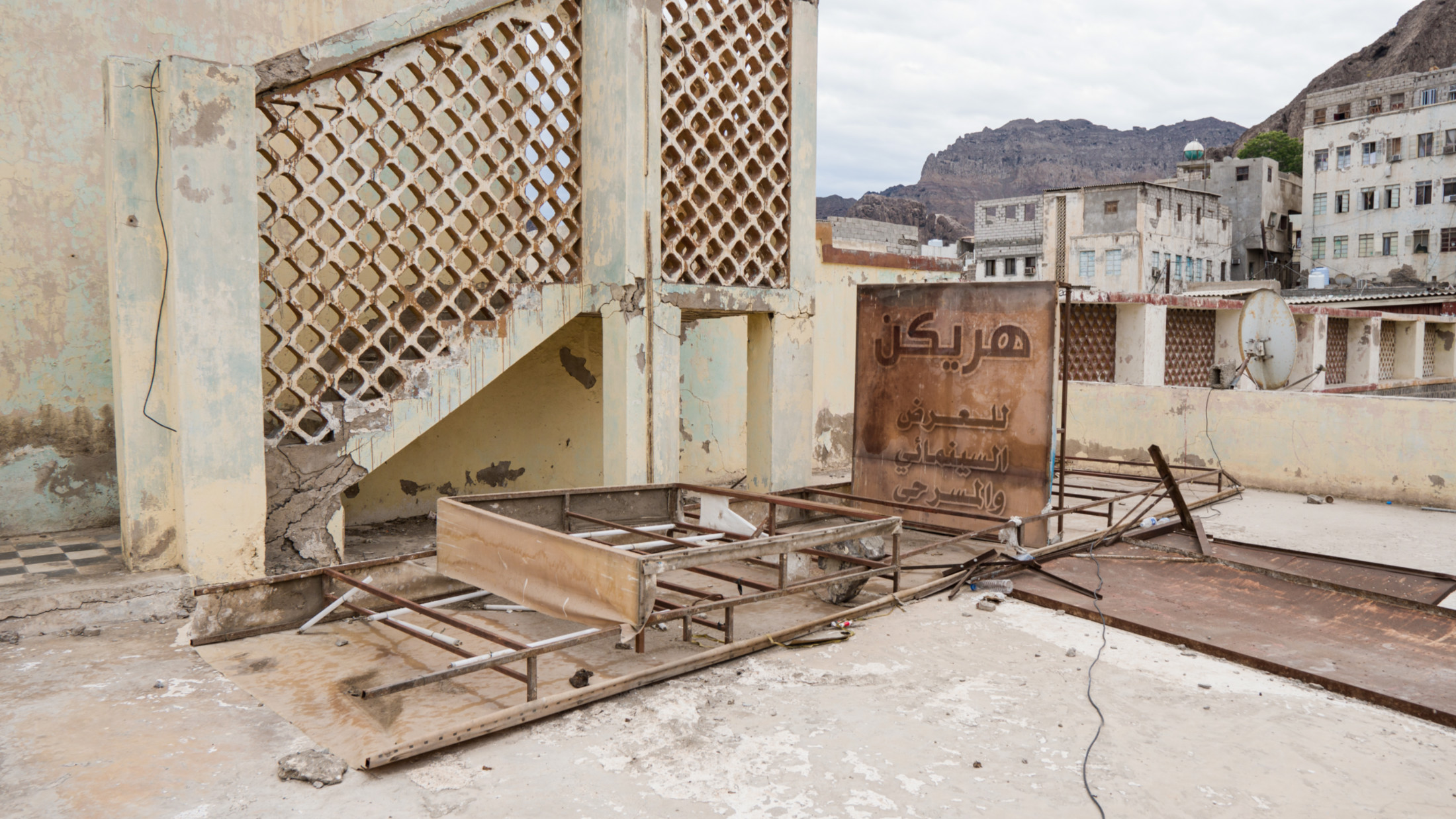Aden has historically been a cultural and commercial crossroads, home to a famed port linking East and West. Its setting, on the Gulf of Aden, at the confluence of the Red and Arabian seas, long brought trade and people to the city, making it a cosmopolitan hub. Throughout much of the 20th century, the city played a prominent role in – among other things – cinema culture in Yemen and the Arabian Peninsula.
That culture, however, has largely disappeared — a victim of modern technology and Yemen’s political troubles. At their height, there were 40 operating movie theaters in Aden. Today there are none. Sadly, prospects for a rebirth of that culture are slim at this time.
The British occupied Aden in 1839, seeking to secure their lines of commerce and communication with India. They would only withdraw in 1967. Although this occupation entailed British influence and control of resources, it also heralded a kind of cultural and commercial renaissance. Cinema was introduced to the city during this time, and it would go on to become one of Aden’s hallmarks. Movies first came to Aden in 1910, when British colonial authorities screened silent black-and-white films for soldiers stationed in the Crater district of the city, as well as British diplomatic and civil service employees and Adeni residents working in British protectorates throughout south Yemen.[1] Soon, films began to be screened throughout the city.
The first local screenings were also held in Crater in 1910, by Mohammed Hammoud al-Hashemi, known as “Master Hammoud.” He began outdoor screenings of Charlie Chaplin’s silent movies in fields or small hangars. He also offered mobile screenings of silent films in the area of Al-Tawahi, in available halls and locations ranging from parking lots and yards.[2] Meanwhile, Abdulaziz Khan screened movies in a square near the Ziko coffee shop, in the old city of Aden.[3]
Mohammed al-Hashemi’s son, Taha Hammoud – known as “the King of Cinema” – built the first movie theater in the city, in the 1930s. It was built in Crater, near the neighborhood of Al-Midan, and called the Hurricane Cinema, after the British fighter plane.[4] It originally had an area of approximately 600 square meters, which Taha doubled in 1942.[5]
Taha Hammoud established other cinemas over the years, up until the 1950s: Al-Jadidah Cinema, in Al-Tawahi; Radio Cinema, in the area of Al-Mualla; and Al-Sharqiyah Cinema in Sheikh Othman.[6] He worked as a movie distributor for major production companies and a number of movie stars.
By 1972, Aden had 10 cinemas. Besides the four owned by Taha Hammoud, there were: Al-Ahliya Cinema (or Al-Baderi Cinema), owned by Hussein Ismael Khodabakhsh, in Crater; Al-Bunyan Cinema, known as “Barafeen,” in Crater; Bilqis Cinema, owned by Jaafar Marza; Regal Cinema, known as “Shahinaz,” owned by Master Haq, in Khormakser; Al-Shaabiya Cinema, owned by Abdo Abdelqader, in Sheikh Othman; and Dar Saad Cinema and Al-Buraiqeh Cinema, in the nearby district of Al-Buraiqeh (or Little Aden). By unification, in 1990, the city had around 40 cinemas,[7] compared to nine in Sana’a, whose first movie theater didn’t arrive until 1959.[8]

Movie screenings were available in many districts in the Aden governorate, and cinemas competed to play the best films. The Hurricane Cinema and Al-Ahliya Cinema focused mainly on Arabic movies, while Al-Buraiqeh Cinema and Rejal Cinema – and Bilqis Cinema, later on – played movies from the West. Shahinaz Cinema was the only theater in Aden to screen Charlie Chaplin’s films. Bilqis Cinema and Al-Bunyan Cinema played the best Indian movies.[9]
During the golden years of Egyptian cinema (1940s thru to the 1960s), films released in Cairo were also screened in Aden. The price of a cinema ticket in Aden during these years was higher than in Egypt.[10] Movies starring Egyptian icons Farid al-Atrash, Abdelhalim Hafez and Mohammed Abdelwahhab were shown. Master Hammoud owned the rights to screen the movies of Farid Shawqi, a well-known Egyptian actor. The movies were exclusively screened at the Hurricane, according to a deal published by newspapers at the time. Khodabakhsh, owner of Al-Ahliya Cinema, monopolized the movies of Al-Atrash, based on a contract he signed with the star. Al-Atrash visited Aden in the mid-1950s at Khodabakhsh’s invitation.[11]
Popular movies shown in Aden in the 1950s and 60s included Mother of India, Summer Holiday (released in 1963 and starring Cliff Richard), Nosferatu: A Symphony of Horror (made in 1922), various Robin Hood movies, Eyes in the Night, and Hobby Fi al-Qahira (My Love is in Cairo). The latter, which was released in 1966, saw Adeni singer Ahmed Qassem act alongside Egyptian actress Zizi El-Badrawy. It was the first movie starring and produced by a Yemeni.
Movie theaters played newsreels before the films began, to keep Adenis up to date with the latest developments – including, for instance, the evolution of Arab nationalism during the days of Eygptian President Gamal Abdel Nasser. Advertisements for shops and businesses in Aden were also shown, as were segments of Muhammed Ali’s fights and Woody Woodpecker cartoons.
According to writer Abdelqader Baras, there was also an attempt to make movies more accessible to those who could not afford tickets to the cinema. “The municipal council held mobile movie screenings using a car that roamed popular neighborhoods and played international silent movies,” Baras reported. “It also played segments on astronauts. The mobile cinema screened the movies on the walls of houses and citizens welcomed this initiative.”[12]
At the time, in the mid-20th century, movie theaters accommodated social traditions regarding women’s modesty. A day was set aside for women, at the request of the citizens, but at the same time, mixing was not a problem, and women were present with men watching some movie shows. The theaters were also used for educational purposes; some movies were screened specifically for students, according to Abdullah Ali Muqbel, a former employee at the now-closed Al-Mualla Cinema.[13]
From 1967 to 1990, the southern provinces of what is now Yemen – including Aden – were consolidated as the People’s Democratic Republic of Yemen (often referred to simply as South Yemen), a Communist-Socialist state. Initially, after the establishment of the new government, cinema owners paid taxes to the state for the establishment of a General Association for Cinema and Theater. They hoped the association would support them and work to improve cinema in Yemen. But, in 1969, the Economic Corporation Law for the Public Sector and National Planning (Law No. 37) was issued, stipulating that cinemas, among other businesses in South Yemen, would be nationalized on December 20, 1970.[14] They became the property of the state and were represented by the General Association for Cinema and Theater.[15]

Lutfi al-Hashemi, the grandson of the original Hurricane Cinema owner, leans over an old poster, May 4, 2021 // Sana’a Center photo by Ahmed Waqqas
Cinema owners were shocked. The association completely took over the work, property and equipment of the cinemas, signing contracts with movie production companies across the world. During these years of communist South Yemen, the Adeni cinemas also sometimes played segments about Lenin and the Socialist International organization before the features.
The nationalization law stirred controversy, because it seized capital and destroyed the private sector and commercial competition. According to Law 37, the Hurricane Cinema, its contents and contracts with production and distribution companies, became state property.
“When they nationalized Hurricane Cinema, we had 850 movies, plus equipment as well as contracts with film companies that were arriving in Aden,” Master Hammoud’s grandson Lutfi Taha Mohammed Hammoud al-Hashemi – who currently owns the Hurricane – told the Sana’a Center. “We used to give 10 percent of our income to the General Association of Cinema but then they nationalized the cinema and confiscated everything. This was a grudge, not nationalization.”[16]
Although the law was harsh on cinema owners, the state maintained support for the sector. The amount of screenings increased, and agreements were struck with Arab and international production companies. Everyone went to the movies; it’s said that even President Salim Rubai Ali (known as “Salimin”) used to stand in line to get tickets.
Nevertheless, cinemas did face constraints in terms of screening some movies, particularly those that addressed topics, causes or figures related to Arab nationalism, revolution or the Socialist International ideology. The work of all movie theaters was supervised, and the Censorship and Categorization Department was formed for the purpose of this oversight. Rather than censoring elements of films (a complicated process that required editing equipment), movies deemed problematic were banned wholesale.
Film censorship was strict but not entirely consistent. The 1972 film Al-Asfour (The Sparrow) provoked outrage across the Arab world but was nonetheless eventually screened in Aden after long discussions. The movie – written, produced and directed by Youssef Chahine – dealt with the defeat of Egypt, Syria and Jordan in the 1967 Six Day War with Israel. Considered an insult to Arab nationalism, it was banned in many Arab countries. The General Association’s Censorship and Categorization Department in Aden objected to the film’s screening, but South Yemen President Abdul Fattah Ismail intervened to allow the movie to be shown.
The movie’s stars, Salah Kabil and Samiha Ayoub, along with editor Rashida Abdelsalam, even visited Aden. A celebration was held in honor of the movie at Bilqis Cinema, and Kabil sat in the front row.[17]
In the latter part of the 20th century, several factors made it challenging for Adeni cinemas to continue functioning. The nationalization law was one of these factors. Although the state supported the role of cinema, the appropriation of cinemas by the state undermined the cinema owners, appropriating their businesses and venues and destroying their capital. The state also acquired cinemas’ film archives and equipment.
In the mid-1980s, regulations changed to allow children to accompany their parents to the movies. This produced conflicting interests among the audiences: some cinemagoers felt that children, often boisterous, disrupted the cinematic experience, while at the same time families in attendance often complained that the films shown were inappropriate for children. Moreover, during this decade, political instability – coming to a head in the South Yemen Civil War, in 1986 – made many families reluctant to go to the movies.[18]

An old poster of an Indian blockbuster film is propped against old rolls shelves in Hurricane Cinema in Aden, May 4, 2021 // Sana’a Center photo by Ahmed Waqqas
In 1990, the unification of North and South Yemen was announced, and the nationalization law was repealed. But the struggles of Aden’s cinemas weren’t over. The new Yemeni government placed the theaters back in the hands of their original owners but did not provide these owners with any financial or technical support. No operational budgets or compensation for the cinemas’ initial seizure were granted. Moreover, the government required the cinema owners pay taxes even before they had resumed their operations. This move was, it seems, designed to push the owners to relinquish their businesses to influential figures.
“In the first week after we took back the [Hurricane] Cinema, my father and I were surprised when three employees from the tax department came to see us,” Lutfi al-Hashemi recalls. “I remember how my father explained to them that it hasn’t even been one week since the cinema was returned to us, after it was confiscated [almost] 30 years ago, and we haven’t made any income! He asked them what they wanted, and they said they wanted us to prepare a monthly report of the number of tickets sold and to pay 30 percent of our income to the tax department.”[19]
Lutfi added that when he and his father took back the cinema in 1995, the local officials mocked the fact that his father was still alive and said they had expected someone much younger, possibly coming from outside Yemen, to try and reclaim the property. The officials, according to Lutfi, had prepared exhausting bureaucratic hurdles with which they had hoped to make the prospective reclaimer despaired and eventually give up their claim to cinema.[20]
In 2007, Lutfi submitted a written complaint about this treatment to then President Ali Abdullah Saleh.[21]
For cinema owners who did hang onto their businesses, the numbers weren’t favorable. It cost thousands of dollars to buy movies to screen. Citizens’ average incomes had declined after unification, and there was consequently a lack of support from the government for movie theaters. Since viewership was down, movies were only screened twice per week, meaning that the returns from screening movies could not cover the cost.
Particularly following the 1994 civil war, the movie sector was marginalized by the new authorities. Financial and administrative corruption also played a decisive role in the decline of cinema in Yemen, in general, and in Aden, in particular, during this period. Many movie theaters closed their doors in the 1990s.
Aref Naji is a civil activist and the manager of Al-Taj Wedding Hall, which was formerly Al-Tawahi Cinema. Naji attributed the closure of many cinemas to “the absence of the government’s role in looking after this arts and cultural sector and the attempts to appropriate some movie theaters.”[22]
The absence of state support and the frustration of cinema owners led some cinemas to be used as theaters for live performances while others (like the Al-Tawahi) were transformed into wedding halls. Still others were sold and demolished. The Hurricane operated, playing increasingly few movies, until 2010. According to Lufti, during the end of this period, the elderly in Aden, who had witnessed the city’s golden age of cinema, would ask him to open the cinema and play some movies. Their numbers eventually decreased as many died, and many were too old to go to the movies – and eventually Lutfi stopped. The cinema was then only used for events and plays every now and then, and then the war erupted.

An old rusted sign of the Hurricane Cinema on top of the building in Aden, May 4, 2021 // Sana’a Center photo by Ahmed Waqqas
Over the course of the current Yemen war, the situation for movie theaters in Aden has further deteriorated. Many of the cinemas have fallen into disrepair. The absence of the internationally recognized Yemeni government and the disinterest of the de facto authorities have been a death blow for the sector, which has had to struggle with poor security and service provision. The electricity crisis and the high exchange rates have been particularly problematic. Movie theater owners in the city have been reluctant to operate their cinemas, due to the rise of social tensions, the deteriorating economic situation and the authorities’ approach.
“When people were not allowed in without first buying a ticket, thugs would start throwing things inside the cinema hall,” Lutfi said. “And when someone got injured, the police would come after the owner of the cinema. When I’d tell them that I have simply signed a contract with the person renting the cinema for the event – a play, for instance – and that the latter should secure the event, the police would reject this. They [used to] say, ‘You are the owner of the cinema and you are the one responsible.’ As a result, I had to close the theater.” He said he closed the business shortly before the current armed conflict began.
At one point, Lutfi recalls, an official from the internationally recognized government’s Ministry of Culture tried to convince him to reopen the Hurricane. “But I told him there was no point doing so, as I was losing more than I was making.” In addition to financial losses, the running of the business was also complicated, as he faced many obstructions.
The internationally-recognized government’s Ministry of Culture claimed on October 30, 2019 that it repaired Cinema Hurricane in Aden, which Lutfi denied in a statement published by Aden Time saying: “We’d like to note that what’s been said (about repairing the cinema) is entirely false… the office of the Ministry of Culture did not voice any interest (in repairing the cinema), and there hasn’t been any communication. We demand that it apologizes.”[23]
Other Adeni cinemas have also suffered. Al-Sharqiya Cinema, in Sheikh Othman district, was established in 1965, making it one of the city’s oldest movie theaters. It was demolished in 2019. The site of the cinema will host a new shopping mall: the final touches are currently being made.[24] Not a single cinema now functions in the city.
Despite the challenges that face the Hurricane and cinemas in Aden in general, Lutfi still resides in Aden and hopes that one day there will be institutions that will show interest in cinema and its revival in the city.
Given the current circumstances, it seems unlikely that movie theaters will relive their glory days in Aden any time soon – or even just start showing movies again. (Currently, movies are occasionally shown in weddings halls.) Security challenges, service shortcomings and official negligence have curtailed the city’s cinema culture. The cinema buildings would need extensive rehabilitation in order to function again, and modern equipment would be required in order to screen movies.
Modern technology also presents a challenge: one Adeni cinemagoer, Sami al-Masaoui’, who witnessed the city’s golden age of cinema, believes that shifts in entertainment technology have impacted consumer habits today and made theaters obsolete. “Many people used to go to the cinema, even women,” he recalled. “I remember that whenever my aunt heard a new Indian movie had been released, she’d say, ‘Let’s go Sami!’ I used to go with her and I was her bodyguard. After satellite dishes became popular, it was no longer important to her [and others] to go to the cinema to watch movies. Things have changed.”[25]
Even before the COVID-19 pandemic, cinema attendance and revenues had dropped off in many countries.[26] Given the rise of televisions then streaming services, cinemas are having to compete with easier, cheaper entertainment options. The pandemic, meanwhile, has shuttered cinemas across the world.
In Yemen, however, it is the economic, political and security situation that will determine the future of Aden’s movie theaters. Reviving Adeni cinemas will require the will and dedication of a national government and the support of businesses and civil institutions. Popular awareness and interest – the real engine behind the rise of any form of art – are also crucial. So, too, are stronger purchasing power, basic security and social trust.